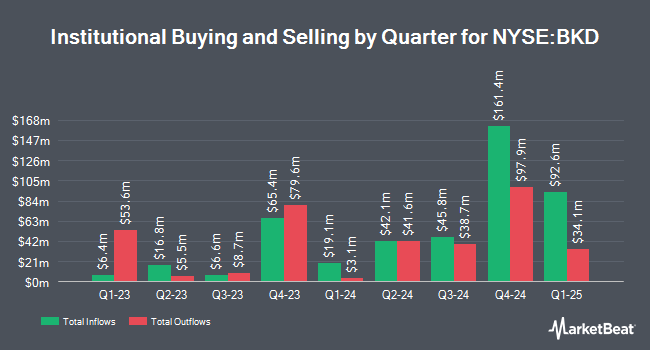Goldman Sachs Group Inc. cut its holdings in Brookdale Senior Living Inc. (NYSE:BKD - Free Report) by 6.1% during the first quarter, according to its most recent Form 13F filing with the SEC. The firm owned 1,150,078 shares of the company's stock after selling 74,303 shares during the period. Goldman Sachs Group Inc. owned 0.49% of Brookdale Senior Living worth $7,199,000 as of its most recent filing with the SEC.
Several other institutional investors and hedge funds have also recently added to or reduced their stakes in the company. ANTIPODES PARTNERS Ltd increased its stake in Brookdale Senior Living by 81.0% during the first quarter. ANTIPODES PARTNERS Ltd now owns 13,684,500 shares of the company's stock valued at $85,672,000 after acquiring an additional 6,124,238 shares during the period. Wellington Management Group LLP boosted its holdings in Brookdale Senior Living by 26.7% during the fourth quarter. Wellington Management Group LLP now owns 9,916,049 shares of the company's stock valued at $49,878,000 after purchasing an additional 2,089,242 shares in the last quarter. Deutsche Bank AG boosted its holdings in Brookdale Senior Living by 8.7% during the first quarter. Deutsche Bank AG now owns 3,987,153 shares of the company's stock valued at $24,960,000 after purchasing an additional 318,463 shares in the last quarter. Charles Schwab Investment Management Inc. boosted its holdings in Brookdale Senior Living by 0.3% during the first quarter. Charles Schwab Investment Management Inc. now owns 3,027,870 shares of the company's stock valued at $18,954,000 after purchasing an additional 9,973 shares in the last quarter. Finally, American Century Companies Inc. boosted its holdings in Brookdale Senior Living by 7.7% during the first quarter. American Century Companies Inc. now owns 2,234,645 shares of the company's stock valued at $13,989,000 after purchasing an additional 159,098 shares in the last quarter.
Brookdale Senior Living Price Performance
Shares of BKD traded down $0.06 on Friday, hitting $7.96. The company's stock had a trading volume of 1,104,041 shares, compared to its average volume of 2,880,135. The company has a market capitalization of $1.86 billion, a PE ratio of -7.58 and a beta of 0.91. The company has a debt-to-equity ratio of 39.87, a current ratio of 0.83 and a quick ratio of 0.83. Brookdale Senior Living Inc. has a fifty-two week low of $4.45 and a fifty-two week high of $8.29. The company has a 50 day moving average price of $7.59 and a 200 day moving average price of $6.82.
Brookdale Senior Living (NYSE:BKD - Get Free Report) last posted its quarterly earnings data on Wednesday, August 6th. The company reported ($0.18) earnings per share (EPS) for the quarter, missing the consensus estimate of ($0.14) by ($0.04). Brookdale Senior Living had a negative return on equity of 107.19% and a negative net margin of 7.60%.The firm had revenue of $812.94 million for the quarter, compared to analyst estimates of $817.63 million. On average, research analysts anticipate that Brookdale Senior Living Inc. will post -0.56 earnings per share for the current fiscal year.
Wall Street Analysts Forecast Growth
BKD has been the topic of a number of recent research reports. Barclays set a $8.00 price objective on Brookdale Senior Living and gave the company an "equal weight" rating in a report on Thursday, August 7th. Royal Bank Of Canada reaffirmed an "outperform" rating and set a $9.00 price objective on shares of Brookdale Senior Living in a report on Wednesday, July 9th. Finally, Wall Street Zen raised Brookdale Senior Living from a "sell" rating to a "hold" rating in a report on Saturday, August 9th. Three equities research analysts have rated the stock with a Buy rating, one has given a Hold rating and one has issued a Sell rating to the stock. According to data from MarketBeat.com, Brookdale Senior Living currently has a consensus rating of "Hold" and a consensus target price of $7.80.
Get Our Latest Report on BKD
Brookdale Senior Living Company Profile
(
Free Report)
Brookdale Senior Living Inc owns, manages, and operates senior living communities in the United States. It operates in three segments: Independent Living, Assisted Living and Memory Care, and Continuing Care Retirement Communities (CCRCs). The Independent Living segment owns or leases communities comprising independent and assisted living units in a single community that are primarily designed for middle to upper income seniors.
Featured Stories

Before you consider Brookdale Senior Living, you'll want to hear this.
MarketBeat keeps track of Wall Street's top-rated and best performing research analysts and the stocks they recommend to their clients on a daily basis. MarketBeat has identified the five stocks that top analysts are quietly whispering to their clients to buy now before the broader market catches on... and Brookdale Senior Living wasn't on the list.
While Brookdale Senior Living currently has a Hold rating among analysts, top-rated analysts believe these five stocks are better buys.
View The Five Stocks Here
Discover the 10 Best High-Yield Dividend Stocks for 2025 and secure reliable income in uncertain markets. Download the report now to identify top dividend payers and avoid common yield traps.
Get This Free Report
Like this article? Share it with a colleague.
Link copied to clipboard.